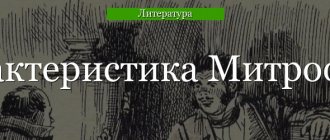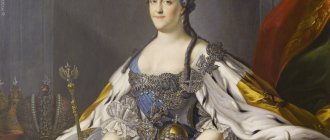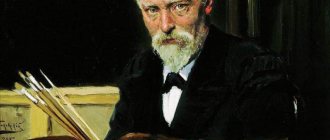The comedy “The Minor” is a brilliant work by Fonvizin, in which the playwright portrayed bright, memorable characters, whose names have become household names in modern literature and the era. One of the main characters of the play is the mother of the undergrown Mitrofanushka - Mrs. Prostakova. According to the plot of the work, the heroine belongs to the negative characters. A rude, uneducated, cruel and selfish woman from the first scene evokes a negative attitude, and in some places even ridicule from readers. However, the image itself is subtly psychological and requires detailed analysis.
We have a new characterization of Prostakova.
The fate of Prostakova
In the play, upbringing and heredity almost completely determine the future character and inclinations of the individual. And the image of Prostakova in the comedy “Minor” is no exception. The woman was raised in a family of uneducated landowners, whose main value was material wealth - her father even died on a chest of money. Prostakova inherited disrespect for others, cruelty towards peasants and the willingness to do anything for profit from her parents. And the fact that there were eighteen children in the family and only two of them survived - the rest died due to oversight - causes real horror.
Perhaps, if Prostakova had married an educated and more active man, the shortcomings of her upbringing would become less noticeable over time. However, she got a passive, stupid Prostakov as her husband, for whom it is easier to hide behind the skirt of an active wife than to solve economic issues himself. The need to manage an entire village herself and the old landowner's upbringing made the woman even more cruel, despotic and rude, strengthening all the negative qualities of her character.
Considering the life story of the heroine, the ambiguous characterization of Prostakova in “The Minor” becomes clear to the reader. Mitrofan is the woman’s son, her only consolation and joy. However, neither he nor her husband appreciates the effort Prostakova expends on managing the village. It is enough to recall the well-known scene when, at the end of the play, Mitrofan abandons his mother, and the husband is only able to reproach his son - Prostakov also remains on the sidelines of her grief, not trying to console the woman. Even with all her grumpy character, Prostakova feels sorry for her, because her closest people abandon her.
What is the fault and what is the problem of Mrs. Prostakova?
In “The Minor” D.I. Fonvizin depicted the vices of society inherent in its modernity. The key figure in the comedy is the landowner Prostakova. This woman's nature is rough and unbridled. In the absence of resistance, she becomes impudent, but as soon as she encounters force, she shows cowardice.
The powerful landowner is merciless to everyone who is in her power, but at the same time she is ready to lie at the feet of those who are stronger.
This is eloquently evidenced by the episode with Pravdin at the end of the comedy. The ignorant bourgeoisie is hostile to education: in her opinion, education is unnecessary. Only out of necessity does she hire teachers for her son Mitrofan, so that her child “comes out into the world.” At the same time, the landowner herself interferes with the educational process. And the teachers, Kuteikin and Tsyfirkin, have been waiting for a salary from her for their work for a whole year.
In relation to people, Prostakova is guided only by commercialism. This is confirmed by her attitude towards Sophia and Starodum. For her own benefit, she is even ready to break the law. She has no concept of morality; she completely lacks a sense of duty, dignity, and philanthropy. Are you enrolling in 2021? Our team will help you save your time and nerves: we will select directions and universities (according to your preferences and expert recommendations); we will fill out applications (all you have to do is sign); we will submit applications to Russian universities (online, by e-mail, by courier); we will monitor competition lists ( we will automate the tracking and analysis of your positions); we will tell you when and where to submit the original (we will evaluate the chances and determine the best option). Entrust the routine to professionals - more details.
A convinced serf woman treats forced people as things that can be dealt with according to her mood. The landowner is sure that the management of the household should be carried out through abuse and assault.
A despotic nature is rude not only to serfs, but also to members of the household. Prostakov’s weak-willed husband “doesn’t count on a penny” and is constantly pushed around by the timid owner. The only one to whom Prostakova is attached with all her heart is her Mitrofanushka. Caring for the well-being and happiness of her offspring is the main component of her existence. But blind, ugly love for a child does not benefit either her or the child.
The author showed the conditions in which Prostakova’s character was formed. This largely explains the ugly forms of her worldview. The family of local nobles was distinguished by ignorance. The parents did not give their daughter a decent upbringing, did not instill moral principles, and did not plant the seed of goodness in her soul. The reigning serfdom also had a great influence on the “inhuman lady.” Being the undivided owner of other people's destinies with perverted moral concepts, she turned into a real tyrant.
However, in the finale, Prostakova collapses, losing everything: her estate, her son, power over the serfs. This defeat can be considered the end of the existing education system and the guarantee of the triumph of new ideas.
Useful material on the topic:
- Characteristics of Mrs. Prostakova
- The image of Mrs. Prostakova
- The character of Mrs. Prostakova
- Characteristics and image of Mrs. Prostakova
- Characteristics of Mrs. Prostakova example
Mitrofan's ingratitude: who is to blame?
As mentioned above, Mitrofan was Prostakova’s only joy. The woman’s excessive love turned him into a “mama’s boy.” Mitrofan is just as rude, cruel, stupid and greedy. At sixteen years old, he still resembles a small child who is naughty and runs around chasing pigeons instead of studying. On the one hand, excessive care and shielding of the son from any concerns of the real world may be associated with the tragic history of Prostakova’s own family - one child is not eighteen. However, on the other hand, it was simply convenient for Prostakova for Mitrofan to remain a big, weak-minded child.
As it becomes clear from the scene of the arithmetic lesson, when a woman solves the problems proposed by Tsyfirkin in her own way, the owner’s “own” landowner wisdom is the main one for her. Without any education, Prostakova resolves any situation by searching for personal gain. The obedient Mitrofan, who obeyed his mother in everything, should also have been a profitable investment. Prostakova doesn’t even spend money on his education - after all, firstly, she herself has lived well without burdensome knowledge, and, secondly, she knows better what her son needs. Even marrying Sophia would, first of all, replenish the coffers of the Prostakov village (remember that the young man does not even fully understand the essence of marriage - he is simply not yet mentally and morally mature enough to understand this).
The fact that in the final scene Mitrofan abandons his mother is undoubtedly the fault of Prostakova herself. The young man learned from her disrespect for relatives and the need to stick to those who have money and power. That is why Mitrofan, without hesitation, agrees to serve with the new owner of the village of Pravdin. However, the main reason still lies in the general “evil nature” of the entire Skotinin family, as well as the stupidity and passivity of Prostakov, who could not become a worthy authority for his son.
Character
Fonvizin places the main emphasis on the character of the landowner. It is absolutely impossible to single out a single positive feature in him. This is a powerful, cruel, despotic woman. She is absolutely immoral and overly rude. The fact that a state inspection came to Prostakova speaks of her very cruel attitude towards her serfs. It especially hits home servants. The landowner treats Mitrofanushka Eremeevna's nanny worst of all.
Prostakova’s rudeness and ignorance is evidenced by her attitude towards her husband. This is a downtrodden person who does not have the right to vote, who is completely subordinate to the will of his wife. The woman not only constantly calls him names, but sometimes even beats him.
The only joy for the landowner is her beloved child - her overgrown son Mitrofanushka. He is the same as his mother, uneducated and ill-mannered. Judging by the fact that the fifteen-year-old has a nanny, he is not accustomed to anything.
In addition, Prostakova has a brawling character. She constantly scolds someone or argues with someone. “From morning to evening, as if hanged by the tongue, I don’t lay down my hands: I scold, I fight; That’s how the house holds together…” she complains to Pravdin.
Prostakova is a lying and hypocritical person. She mistreats her pupil Sophia, knowing that she is not rich. He wants to marry her to his brother, who is not much different in character from the lady herself. But upon learning that Sophia is becoming a rich heiress, the landowner dramatically changes her attitude towards her: she becomes affectionate and friendly. Prostakova began to envision her son as the girl’s husband.
Her greed and debauchery is evidenced by the fact that the peasants of the estate have been robbed to the bone. “Since we took away everything the peasants had, we can’t rip off anything,” Prostakova complains to Skotinin.
A description of the negative aspects of the landowner will be incomplete without mentioning such traits as greed and thirst for profit. These traits are most clearly manifested in the episodes associated with Sophia.
Prostakova as a bearer of outdated morality
In “The Minor,” Mrs. Prostakova is contrasted with two characters – Starodum and Pravdin. Both men are bearers of humane educational ideas, contrasting with outdated, landowner foundations.
According to the plot of the play, Starodum and Prostakova are parents of young people, but their approach to education is completely different. The woman, as mentioned earlier, pampers her son and treats him like a child. She doesn’t try to teach him anything; on the contrary, even during the lesson she says that he won’t need the knowledge. Starodum communicates with Sophia on equal terms, shares his own experience with her, passes on his own knowledge and, most importantly, respects her personality.
Prostakova and Pravdin are contrasted as landowners, owners of large estates. The woman believes that beating her peasants, taking their last money, treating them like animals is quite normal. For her, the inability to punish the servants is as terrible as the fact that she lost her village. Pravdin is guided by new, educational ideas. He came to the village specifically to stop Prostakova’s cruelty and let people work in peace. By comparing two ideological directions, Fonvizin wanted to show how important and necessary reforms in the education of Russian society of that era were.
Essay on the topic Who is to blame for the troubles of Mrs. Prostakova If possible, not from the Internet
The comedy by D. Fonvizin “The Minor” tells about the events that took place in the Prostakovs’ house. Their main participants are Mitrofan, the son of the owner of the house, his mother, Mrs. Prostakova, and Starodum with his niece.
Mrs. Prostakova madly loves her son, cares and fusses overly with him, indulging all his whims and whims, which is why Mitrofan grows up as an absolutely dependent person, whose level of development does not at all correspond to his age. But Mrs. Prostakova blindly follows his wishes. She sees her future in her son, repeating all the time: “This son is my only consolation!” And at the same time she does nothing to ensure that her son grows into something worthwhile. Mitrofan is taught literacy by bad teachers, and he himself does not want to learn. However, the mother considers her son the best and most educated, although this lazy fellow has no intelligence or knowledge.
With her husband, Mrs. Prostakova behaves as if she does not consider him a person at all, let alone the head of the family. She decides all issues herself, regardless of his opinion and neglecting it when it comes to Mitrofan.
Mrs. Prostakova is a cruel and unfair mistress towards her servants and peasants. She can severely punish a tailor for sewing a suit incorrectly, and does not pay attention if one of the servants gets sick. Mrs. Prostakova scolds Eremeevna for every “mistake.” For example, if Mitrofanushka ate too many buns at dinner, and Eremeevna showed concern about this, she says: “Do you feel sorry for the sixth bun, you beast? That’s the kind of zeal.” It never occurred to her that overeating would not be good for her son. Prostakova considers all serfs to be her property, practically a thing, so she allows herself to thoughtlessly manage their lives and rip them off like a stick, simply at her whim.
Mrs. Prostakova treats Sophia like an evil mistress. She is always rude and cold. But as soon as she finds out that Starodum, Sophia’s uncle, left his niece a large inheritance, she changes her behavior, becomes hypocritically kind and affectionate, and calls her “dear friend.” Now Prostakova wants to marry her son to Sofia in order to receive all her money as a dowry, refusing this to her brother, although she previously agreed to this marriage. Having learned that Sofia is betrothed to officer Milan and that Starodum agreed to this, Prostakova wants to marry her son to the girl by force and deception. However, her idea failed. By law, the village was taken away from her, depriving her of power.
Mrs. Prostakova was a cruel, headstrong woman who did not take into account the interests and feelings of other people, which is why she lost everything. In the image of Prostakova, Fonvizin reveals the negative traits of a narrow-minded, unscrupulous person with power, who through his actions brings both himself and his loved ones into trouble. The author shows that you can get wealth without losing honor and human face. And people like Prostakova ultimately pay for all the evil caused.



